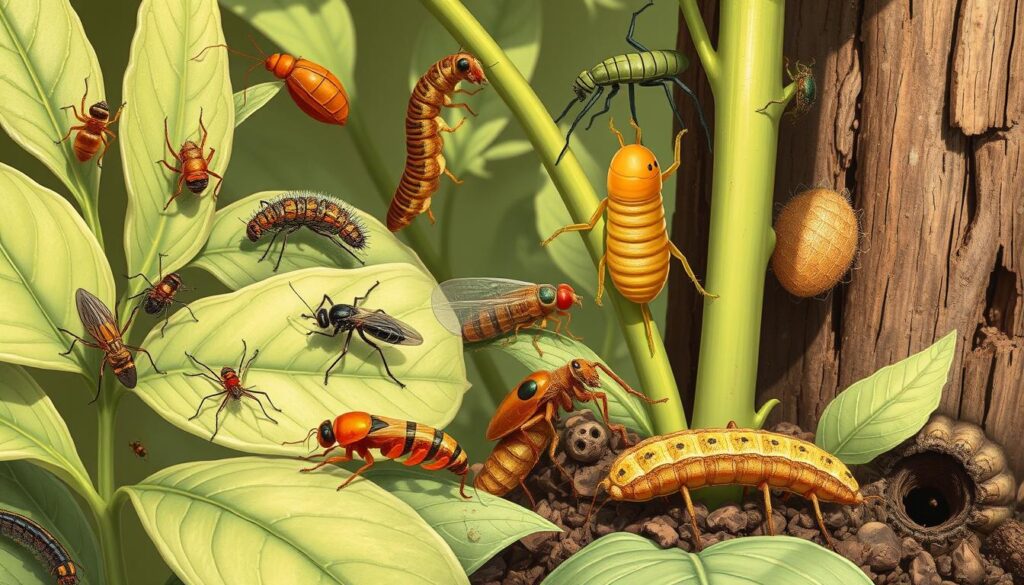Keeping gardens healthy is rewarding, but dealing with pests is tough. Learning how to fight these pests is key for gardeners who want their plants to flourish. Using natural methods to control pests helps prevent them and is good for organic gardening. This article will share useful tips for pest management that are good for your garden and the planet.
Understanding the Impact of Plant Pests
To manage plant pests well, we need to know the different kinds that can harm gardens. Each type of pest brings its own problems, affecting plant health in unique ways. It’s vital for gardeners to learn about these pests to protect their gardens and keep them healthy.
Anúncios
Common Types of Plant Pests
Here are some common plant pests:
- Aphids
- Slugs and snails
- Spider mites
- Leafhoppers
- Raccoons and rabbits
Signs of Pest Infestation
Knowing how to spot pest problems is key for keeping them under control. Look out for these signs:
Anúncios
- Wilting or yellowing leaves
- Bite marks or holes in foliage
- Sticky residue on plants
- Visible insects or webbing
- Droppings or frass around plants

Why Choose Natural Pest Control Methods
Exploring natural pest control methods shows big benefits compared to traditional ways. Gardeners looking for sustainable options find these methods vital. They help keep plants and the environment healthy.
Benefits of Natural Control
Natural pest control brings many good things:
- It encourages a variety of life that keeps the environment balanced.
- It protects helpful insects, aiding in pollination and controlling pests.
- It boosts soil health, cutting down the need for chemical fertilizers.
- It lessens chemical residues on crops, making our food safer.
Harmful Effects of Chemical Pesticides
The downsides of chemical pesticides are worrying. These chemicals can:
- Harm bees and other non-targeted species.
- Pollute soil and water, causing lasting harm to nature.
- Risk the health of humans and pets due to toxins.
Creating a Healthy Garden Ecosystem
Having a healthy garden ecosystem is key for keeping pests away. Good soil helps plants grow strong and fight off pests and diseases. By adding organic compost, we can improve the soil’s nutrients and drainage. This helps plants develop tough roots to stand up against pests.
The Role of Healthy Soil in Pest Management
Healthy soil is the base of a great garden. It helps plants grow well, which makes them better at dealing with pests. Using methods like crop rotation and cover cropping stops pests from becoming a big problem. Spending time on soil care builds a garden that naturally fights pests.
Importance of Biodiversity
Biodiversity makes a garden much better. A mix of plants attracts good insects that control pests. By planting many species, gardeners pull in bugs that eat harmful pests. This not only cuts down on pest problems but also makes the garden healthier.
Effective Strategies to Combat Plant Pests
Using smart strategies to fight plant pests can make your garden healthier and more productive. Methods that match nature, like ecological gardening, help plants grow better and keep pests away naturally. Main strategies are to attract helpful bugs and to plant certain plants together.
Encouraging Beneficial Insects
Good insects are key to keeping harmful pest numbers down. Ladybugs and lacewings, for example, eat aphids and protect your plants. By creating a friendly environment for these helpful insects, gardeners can have a healthier garden with less need for chemicals.
Companion Planting Techniques
Planting certain plants together, known as companion planting, naturally keeps pests away. Marigolds, for example, can deter pests and help the plants around them thrive. This method creates a garden full of diversity that helps plants stay strong against pests. Learning which plants help each other out can make a big difference.
Utilizing Physical Barriers in Your Garden
Adding physical barriers to your garden helps keep pests out and improves plant health. These barriers block pests without using chemicals. This is a direct way to keep your plants safe.
Types of Barriers and Their Uses
There are different barriers to protect your garden:
- Row Covers: Lightweight fabrics that shield plants from insects while letting in sunlight and moisture.
- Chicken Wire: Keeps bigger animals like rabbits from eating your plants.
- Netting: Stops birds from eating fruit but doesn’t harm helpful insects.
- Garden Fencing: A solid way to keep out large pests such as deer.
Seasonal Considerations for Barrier Application
It’s important to think about the seasons when using barriers. In spring, use light materials for changing weather. When it gets to fall and winter, choose stronger barriers to fight off the cold and pests. By changing barriers with the seasons, you help your garden stay pest-free and healthy.
The Power of Homemade Pest Control Sprays
Making your own pest sprays is a great DIY project. It gives gardeners safe and green ways to fight off pests. These sprays can be made from things like garlic to neem oil. Using natural stuff not only fights pests but also keeps the planet safe.
Simple Recipes for DIY Sprays
It’s easy to make your own pest sprays with things you have at home. Here are some ideas:
- Garlic Spray: Mix three cloves of garlic with water. Filter it and add more water for a strong bug spray.
- Neem Oil Spray: Mix 2 teaspoons of neem oil with one tablespoon of liquid soap in a gallon of water. This mixture keeps bugs away.
- Cayenne Pepper Spray: Combine a tablespoon of cayenne pepper with a quart of water. After letting it sit overnight, strain it before use.
How and When to Apply Homemade Remedies
The timing is key to how well homemade pest sprays work. It’s best to spray plants in the cool of the morning or late afternoon. This prevents harm to your plants. Spray often, especially after it rains, to keep your garden safe. Choose the right spray to target specific bugs. This helps your garden stay healthy.
Maintaining Garden Cleanliness for Pest Prevention
Keeping your garden clean is key to stopping pests. A neat garden deters pests, protecting your plants and their health. Use the right garden care methods, and your garden will flourish. Regular upkeep boosts hygiene and the health of your plants.
Best Practices for Garden Upkeep
- Remove dead leaves and debris regularly to minimize hiding spots for pests.
- Prune plants as needed to improve air circulation and reduce dampness.
- Ensure garden tools are cleaned and stored properly to prevent pest infestations.
- Regularly mow grass and trim edges to prevent overgrowth that may attract pests.
How to Properly Manage Compost and Debris
Good compost management is vital for a clean garden. A properly cared for compost bin improves soil and keeps pests away. Stick to these steps for effective composting:
- Turn the compost regularly to ensure proper aeration and avoid stagnation.
- Avoid adding meat, dairy, or oily substances which may attract rodents.
- Monitor moisture levels to keep the right balance for decomposition and deter pests.
Using Attractants to Bring in Beneficial Species
To have a garden that lives and breathes, you need good bugs. Adding the right plants can really help bring these helpful insects in. This makes your garden look great and helps fight off bad pests naturally.
Plants that Attract Natural Predators
Choosing plants that predators love can change the battle against pests. Some top plants include:
- Yarrow
- Asters
- Fennel
- Marigolds
- Coriander
These plants are not just pretty. They offer food for insects like lacewings and ladybugs. Having them bloom at different times keeps good bugs in your garden all season.
Creating Habitats for Beneficial Insects
It’s key to have diverse homes for these helpful bugs. You can:
- Plant native species to make them feel at home
- Use plants of different heights
- Mulch to keep them cozy and damp
These steps build great habitats for insects. A mix of plants invites more varieties to stay. This way, your garden always has helpers to fight pests. Focusing on lots of different plants makes your garden healthier and more balanced.
Animal Deterrents: Protecting Your Garden
To keep gardens safe from larger animals, it’s key to look into effective animal deterrents. These methods protect your plants while also living in harmony with local wildlife. They help gardeners keep their landscapes beautiful without unwanted visitors.
Sound and Motion Devices
Devices that make sound or move can stop animals like deer and rabbits. Deterrents include:
- Motion-activated sprinklers that surprise animals with jets of water
- Ultrasonic repellents that emit sounds pests find uncomfortable
- Wind chimes or reflective objects that make noise and move
These techniques make gardens less attractive to big wildlife.
Natural Repellents for Larger Pests
Natural repellents are a green way to keep animals out. You can use:
- Cayenne pepper or garlic spray to keep herbivores away
- Mint or marigold plants that many pests don’t like
- Human hair or pet fur around the garden
This approach protects the garden without hurting the animals. It’s a caring way to keep your garden healthy.
Monitoring and Identifying Pests
Monitoring pests is key to keeping gardens healthy. By watching pest numbers, gardeners can choose the best times to act. Knowing when pests are weakest helps decide on control methods. Correctly identifying pests makes monitoring more effective, leading to better management.
Keeping Track of Pest Populations
Watching for pests often reveals their habits. Tools like
- Sticky traps for flying bugs
- Magnifying glasses for close-ups
- Field journals to note down findings
This approach helps stop infestations early.
Understanding the Lifecycle of Common Pests
It’s important to know how pests grow. For instance, understanding aphids from young to adult helps pick the right time to act. Caterpillars are another example; knowing their growth stages is key to controlling them effectively. Being familiar with these cycles improves monitoring and garden health.
Conclusion
We’ve learned that managing garden pests is key to a healthy and vibrant garden. Using natural methods to keep pests away helps the garden. This way, good bugs come and help, while bad chemicals stay away.
To keep your garden flourishing, you need a plan that uses different ways to control pests. Watching and learning about the pests in your garden helps. This knowledge leads to a garden full of beautiful plants and good food.
By following these tips, you’ll be better at dealing with pests. Putting in the work for a green garden is worth it. You’re not just helping your garden, but you’re also making the earth a better place.
FAQ
What are the most common types of plant pests?
How can I identify signs of pest infestation?
What are some natural pest control methods I can use?
Why are chemical pesticides harmful?
How does healthy soil contribute to pest resistance?
What strategies can I use to encourage beneficial insects?
What are effective physical barriers for pest control?
Can you recommend a homemade pest control spray?
What best practices should I follow to maintain a clean garden?
How can I deter larger animals from my garden?
How can I monitor pest populations effectively?
Content created with the help of Artificial Intelligence.



